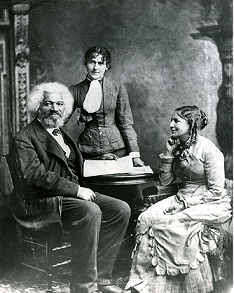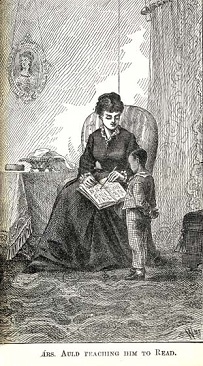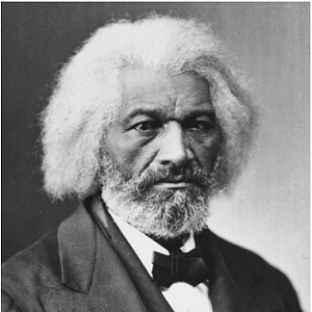 |
| Douglass and Pitts (http://en.wikipedia.org/wiki/File:Douglass_Helen_E ()) |
"I prayed for twenty years but received no answer until I prayed with my legs." This quotation was by Frederick Douglass regarding slavery and escape. One can interpret it as a comparison to hoping versus acting. No matter how hard a person hopes and wishes for change, nothing will ever happen until he or she takes action and works for it. Douglass demonstrated many actions of heroism and became a nationally recognized figure for his speeches and writings. Frederick Douglass was an African American slave whose mother was Harriet Bailey (who was also a slave) and father was an unknown white man. He was born in Tuckahoe, Maryland in February, 1818. He married Anna Murray and had 5 children with her, but when Murray passed away, he married his secretary, Helen Pitts. This marriage was controversial because Pitts was a white woman. However, Douglass and Pitts proved society wrong and became role models by showing that relationships between the two races could work out peacefully. Frederick Douglass was a heroic orator and writer who presented inspirational, thought-provoking speeches and detailed stories about his personal life. Heroes must possess courage, a kind heart, and determination, and because he had these traits, Frederick Douglass was a hero.
 |
| Douglass and Sophia Auld (http://docsouth.unc.edu/neh/dougl92/dougl95.jpg () ()) |
Frederick Douglass displayed courage when he was willing to sacrifice his own safety and life to protect others. He orated in front of the authorities and those who disapproved of him and his work. They could have easily harmed him, which he was fully aware of, but he still continued to present his speeches: "These were difficult but rewarding years for Douglass, who was often forced to deal with hostile if not openly violent audiences.Initially when addressing his audience, Douglass stuck with the stories of his young slavery; soon, though, he grew more confident and began to address the entire wrong-headed concept of slavery" (Authors and Artists for Young Adults). There were often men in Douglass's audience who opposed him and his beliefs. Douglass learned to ignore them and speak his mind even when he knew that what he said would upset them. As he pursued his speaking career, he started to open up and talk about more controversial subjects, which angered more people. Not many people would be able to express themselves in front of such a huge crowd knowing that they would be judged harshly. Frederick Douglass found a way to overlook the critics and courageously carried out his speeches, which sets him apart as a hero. He also bravely risked his life by helping other slaves at Sabbath school: "During this time he also conducted Sabbath school, teaching other slaves how to read, a dangerous occupation" (Authors and Artists for Young Adults). This was a time when education was strictly for white people, and that was what set the white and colored people apart the most; white people had the knowledge that slaves couldn't get without proper schooling. If a slave was to have the same intelligence as his owner, there would be no authority, no difference. Because slave owners feared that this would happen, anyone who tried to teach slaves would be punished. Douglass went out of his way to educate slaves so that they would prosper more in the long run. Frederick Douglass displayed courage when he fought for his people's rights, and that courage is one trait that makes him a hero.
Heroes not only have to be brave, but they also need to have kind, caring hearts. Humans are judgmental by nature, and it is by instinct that they unkindly evaluate people before getting to know them. In the case of Frederick Douglass, however, he chose to look beyond the stereotypes, generalizations, and personal biases: "And here I saw what I had never seen before; it was a white face beaming with the most kindly emotions; it was the face of my new mistress, Sophia Auld. I wish I could describe the rapture that flashed through my soul as I beheld it. It was a new and strange sight to me, brightening up my pathway with the light of happiness" (The Narrative of the Life of Frederick Douglass). It would be assumed that almost all slaves and colored people hated every white person back in the day, but Frederick Douglass was an exception. He neither judged nor hated the white woman based on background or race. Instead, he respected her as an individual. Most African Americans would disregard or judge white people based on the action of others, but Frederick Douglass respected Mrs. Auld and took in her beauty as a single human before coming to bad conclusions about her. He also loved everyone no matter what race, ethnicity, or background, and he cared for the wellbeing of others and society. "'I love Humanity all over the globe. I am anxious to see Righteousness prevail in all directions'" (Country, Conscience, and the Anti-Slavery Cause). Douglass wanted everyone to know that he cared about them regardless of their upbringing. He showed kindness and concern for people he didn't even know because everyone is human. Along with that, he advocated justice and righteousness around the world, which shows how compassionate he is for everyone and everything. Douglass's kind heart is inspiring and makes a good role model for people to follow.
It takes great determination to become a hero. One can't simply sit around and wait for something miraculous to happen. Douglass was determined in whatever he did, and he always actively gave his all when trying to accomplish a task: "Determined to escape, Frederick borrowed some seaman's "protection" papers from a black sailor and, clothed in sailor's garb, on September 3, 1838, took a train for Philadelphia" (Historic World Leaders). Even when it came to something as simple (yet complicated) as escaping, he put 100% of his effort into what he was doing. He could have escaped normally like many other slaves, but he went so far as to create an identity for himself for extra security. He took the extra step to ensure his safety and make the job easier. Even as a child, Douglass was determined to not only make a difference, but to be the difference: "Hearing Hugh reprimand Sophia for teaching him, on the grounds that education would 'forever unfit him to be a slave,' Frederick was determined to receive an education. At age 13, having managed to obtain 50 cents, he bought his first book, The Columbian Orator, a standard rhetoric text that contained famous speeches on human freedom. On neighborhood errands, he would secretly exchange food with hungry white children for reading lessons" (Historic World Leaders). When Frederick Douglass heard that education would make him unfit to be slave, he immediately became determined to get the education that most African Americans weren't privileged enough to receive. This determination was what started his career, because without the first steps of education, it would have been almost impossible to gain the knowledge he did to become an influential speaker. Because of his incessant drive to succeed and become educated, he became the hard-working hero he is known as today. Through his hard work and resolve, Frederick Douglass was able to gain the title of a hero.
 |
| (http://www.biography.com/imported/images/Biography ()) |
Because of his courage, kind heart, and determination that he showed throughout his life, Frederick Douglass can accurately be defined as a hero. Douglass could risk everything he had to promote the wellbeing of others, and he could fight for what he believed in with a firm position and unwavering voice. He was able to look past the judgments and generalizations of others and welcome anyone with open arms. And lastly, he did whatever he set his mind to with 110% effort and nothing less. Douglass's outgoing and confident personality is definitely something to look up to. I admire the way he did everything with and for love and justice. Frederick Douglass took action to make a change in the way people thought and reacted towards slavery and racialism. He didn't sit around and wait for magic to happen in front of him. He didn't just pray and hope that everything would fall into place. Frederick Douglass became the difference and the change, and he became a hero.
Works Consulted
"Country, Conscience, and the Anti-Slavery Cause." Human and Civil Rights: Essential Primary Sources. Ed. Adrienne Wilmoth Lerner, Brenda Wilmoth Lerner, and K. Lee Lerner. Detroit: Gale, 2006. 96-100. Gale Biography In Context. Web. 10 Dec. 2012.
"Frederick Douglass." Authors and Artists for Young Adults. Vol. 48. Detroit: Gale, 2003. Gale Biography In Context. Web. 7 Dec. 2012.
"Frederick Douglass." Historic World Leaders. Gale, 1994. Gale Biography In Context. Web. 6 Dec. 2012.
"Douglass, Frederick." International Encyclopedia of the Social Sciences. Ed. William A. Darity, Jr. 2nd ed. Vol. 2. Detroit: Macmillan Reference USA, 2008. 438-440. Gale Virtual Reference Library. Web. 10 Dec. 2012.
Douglass, Frederick. The Narrative of the Life of Frederick Douglass. Boston: n.p., 1845. Project Gutenberg. 10 Jan. 2006. Web. 6 Dec. 2012.
"Douglass, Frederick." U*X*L Encyclopedia of U.S. History. Sonia Benson, Daniel E. Brannen, Jr., and Rebecca Valentine. Ed. Lawrence W. Baker and Sarah Hermsen. Vol. 2. Detroit: UXL, 2009. 459-462. Gale Virtual Reference Library. Web. 10 Dec. 2012.
Page created on 1/9/2013 12:00:00 AM
Last edited 1/9/2013 12:00:00 AM
